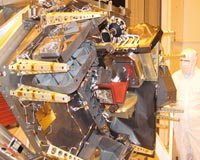 |
Abu Dhabi, UAE (SPX) Dec 03, 2009 Rapid development in the Middle East space industry is building a strong demand for a skilled and well-trained workforce to take it forward, creating opportunities for young Arabs to become the next generation of space engineers and scientists Dr. Salem Issa, Associate Professor, Department of Geology, Faculty of Sciences at the UAE University, will tell next week's Global Space Technology Forum in Abu Dhabi that educational institutions have an important role to play in opening up career paths into the space industry for Emiratis and other Arab nationals. "Since the late 1980s, interest in the space-related field has been burgeoning and the pace of new developments continues to grow," said Dr Issa. "The UAE is pushing into a new era, highlighted by the recent launch of Dubai-Sat 1 and YAHSAT's capability of buying and servicing satellites. "Until very recently, most of the employees in geospatial technologies working in the UAE were expatriates. But UAE educational institutions offering space-related courses can now give Emiratis and other Arab nationals the skills they need to be the next generation of space engineers and scientists." Dr Issa is speaking on space education at the second annual Global Space Technology Forum, organised by Streamline Marketing Group and taking place from 7-9 December at the Abu Dhabi National Exhibition Centre. He will be joined by Dr Michael Simpson, President of the International Space University (ISU). Since the 1990s, the UAE University (UAEU) has taught space-related courses including Geographic Information Systems (GIS), remote sensing, photogrammetry, survey data acquisition and digital mapping. In 2005, UAEU launched the Master of Sciences in GIS and more than 25 graduates have joined the UAE's geospatial workforce in the last two years. Dr Issa believes that space-related courses give students a breadth of skills, such as geospatial literacy, lateral and critical thinking, statistical analysis and computer skills, opening the door to a vast array of career options for graduates in the UAE and across the region. "The courses are essential for examining issues such as regional development, land use planning and environmental monitoring," he said. "Students are taught how to interrelate information derived from sources such as maps, surveys, photographs and satellite imagery, using a variety of methods of spatial referencing. "Applications of geospatial technologies in the UAE and across the region are also in high demand in municipalities, telecommunication, water, electricity, oil, home security and coastal sectors. As organisations experience rapid growth in the volumes of spatial data, they need an increasing number of well trained people to manage this data." Michael Simpson, President of the International Space University (ISU) says that while ISU does not currently offer space-related courses in the MENA region, there is scope for increased collaboration with the region's educational institutions in the future. "If the UAE universities and relevant authorities made a proposal, we could offer short technical courses or a Space Studies Program (SSP) in the future. Countries usually bid to host a SSP two years in advance, and then ISU selects a suitable location to accommodate its students and faculty for nine weeks," said Simpson. Based in Strasbourg, France, ISU is a graduate school for interdisciplinary space education and helps to develop the future leaders of the world space community. ISU has a network of 2,900 graduates from 100 countries, including seven alumni from the Gulf region, and an international faculty and staff. Rick Theobald, Commercial Director of Streamline Marketing Group, organisers of the Global Space Technology Forum said, "It is an exciting time for the Middle East space industry, with many space and satellite projects on the horizon. Space education has an increasingly important role to play to ensure there are enough space engineers to sustain and drive future growth." Share This Article With Planet Earth
Related Links Global Space Technology Forum The latest information about the Commercial Satellite Industry
 Space Jobs Go Wanting
Space Jobs Go WantingBethesda MD (SPX) Dec 01, 2009 It has come to our attention that there are literally hundreds of professional positions available in the space industry that cannot be filled. At a time when there are millions of people out of work due to the worldwide recession the space industry seems to be booming with projects, contracts and a variety of other activities that require space professionals with some experience in all levels ... read more |
|
| The content herein, unless otherwise known to be public domain, are Copyright 1995-2009 - SpaceDaily. AFP and UPI Wire Stories are copyright Agence France-Presse and United Press International. ESA Portal Reports are copyright European Space Agency. All NASA sourced material is public domain. Additional copyrights may apply in whole or part to other bona fide parties. Advertising does not imply endorsement,agreement or approval of any opinions, statements or information provided by SpaceDaily on any Web page published or hosted by SpaceDaily. Privacy Statement |